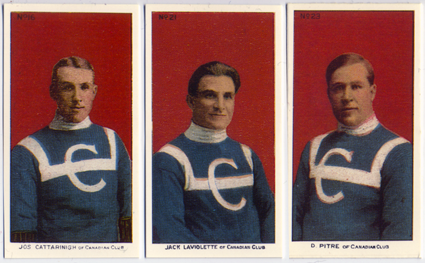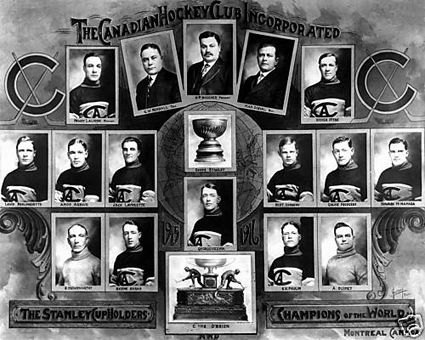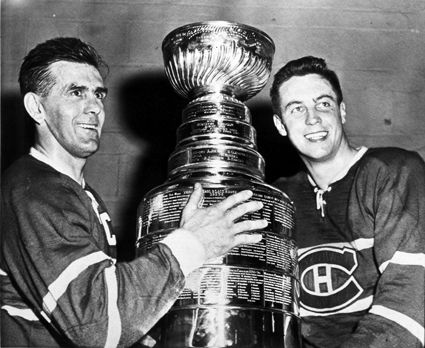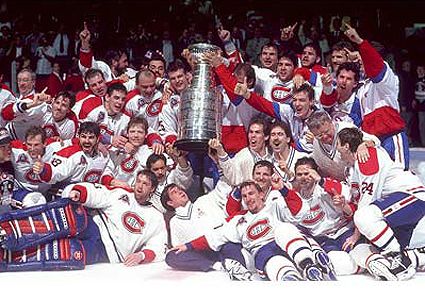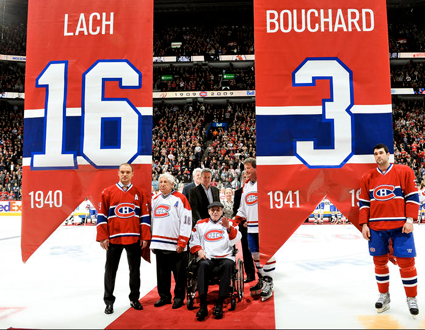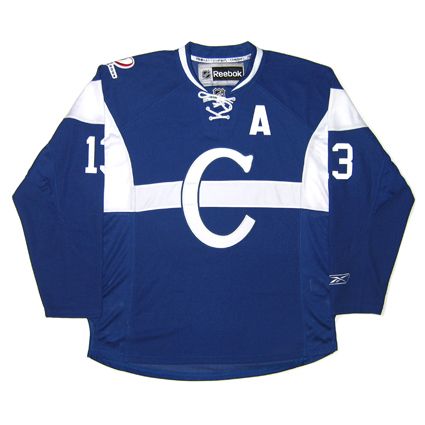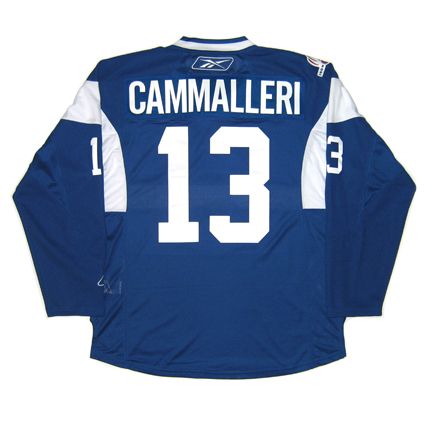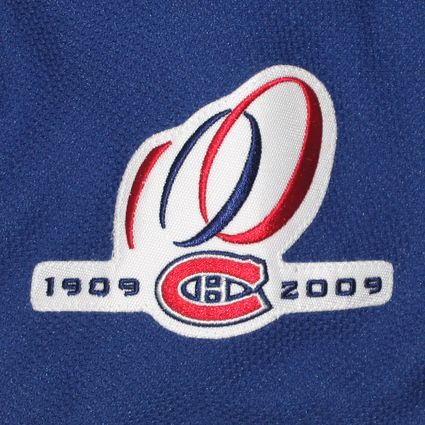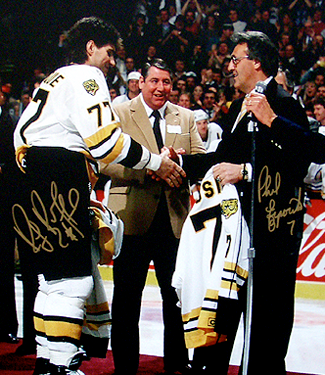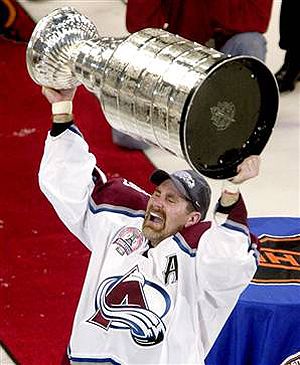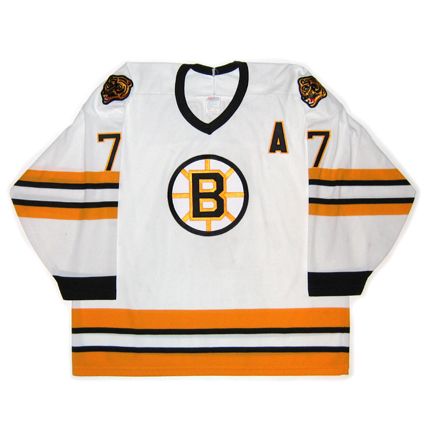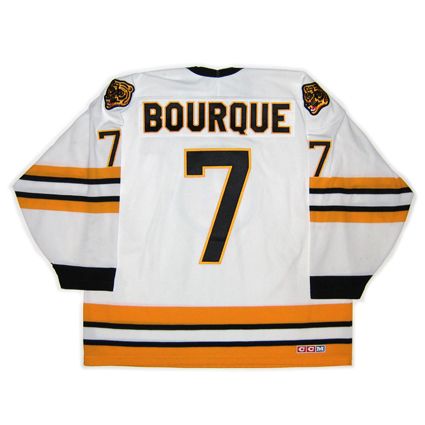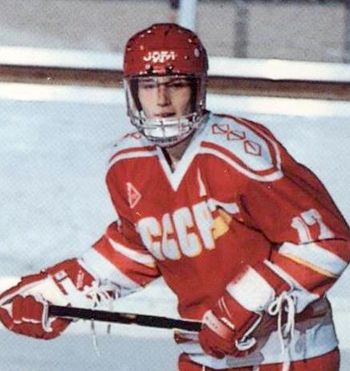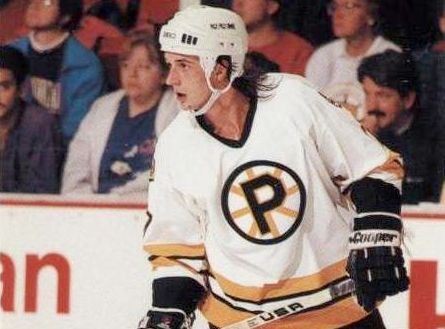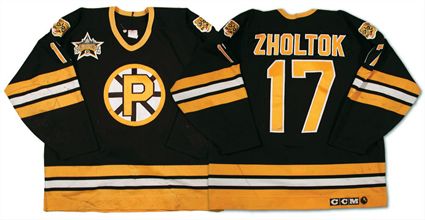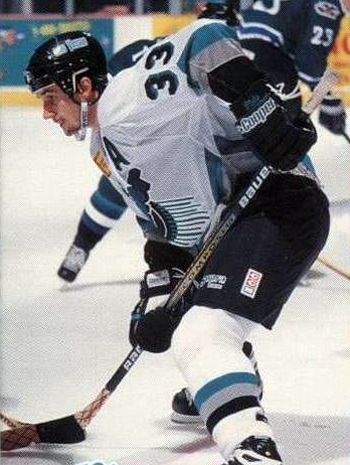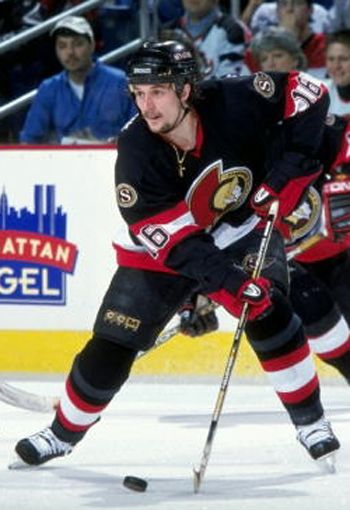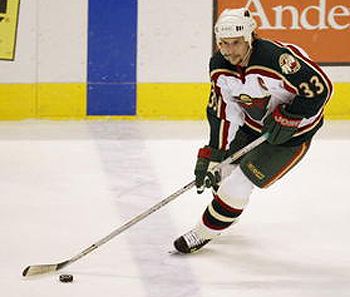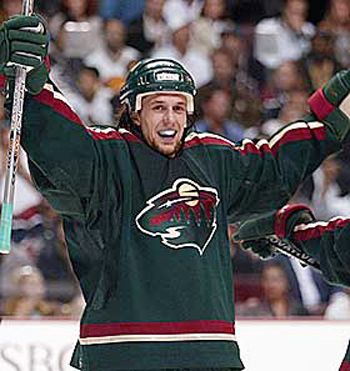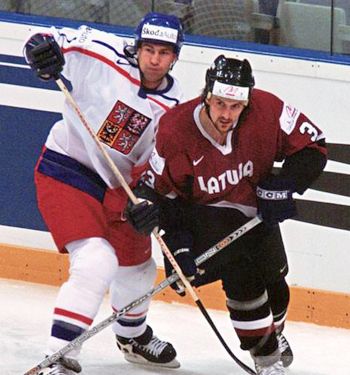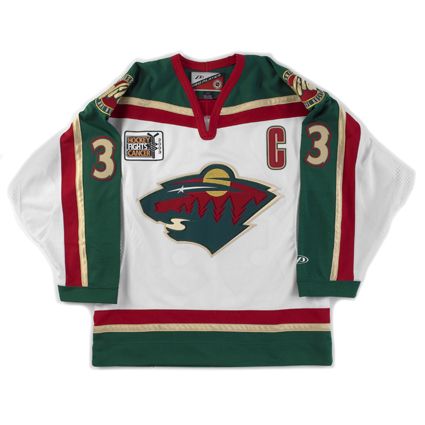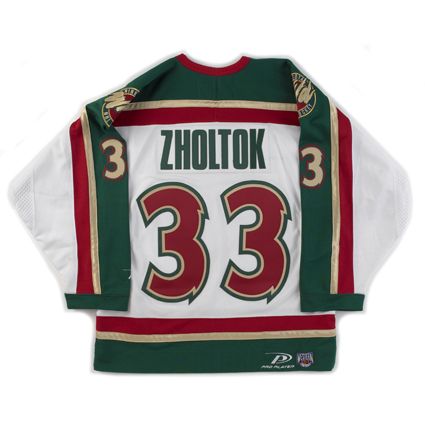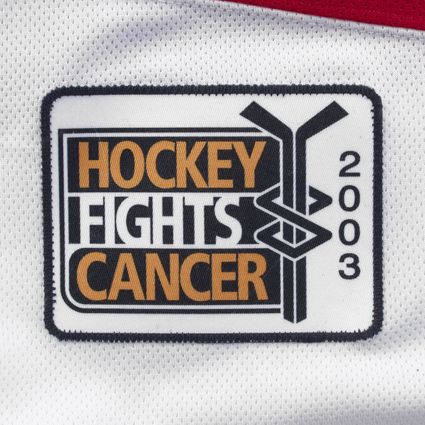Born on this date in 1972, Sergei Zholtok was originally drafted by the Boston Bruins 55th overall in the 1992 NHL Entry Draft after playing two seasons with his hometown club Dynamo Riga in Latvia. Prior to being drafted, Zholtok won a silver medal at the 1991 World Junior Championships while skating for the Soviet Union, of which Latvia was still a member.
Zholtok caught the eye of NHL scouts at the World Juniors
He then won a gold at the 1992 World Juniors during a remarkable period in history, as the team arrived in Finland as the Soviet Union, winning their first three games, including one on December 31st, 1991, before their country ceased to exist and they played their game on January 1st, 1992 as the Commonwealth of Independent States (CIS)!
Zholtok spent the majority of his first season in North America of 1992-93 playing with the Providence Bruins of the AHL, appearing in one game with Boston, registering an assist for his first NHL point.
Zholtok made his North American debut with the P-Bruins
1993-94 was split between Providence (54 games) and Boston(24 games), and saw him score his first NHL goal against fellow Latvian Arturs Irbe.
The Providence Bruins would be his home for the entire 1994-95 season and he would score 23 goals and 35 assists for 58 points in 78 games.
Zholtok's 1994-95 Providence Bruins jersey
with the AHL All-Star Game patch
Zholtok would have his breakout season the following year with the Las Vegas Thunder of the IHL scoring 51 goals and 50 assists for 101 points in 82 games, all career highs.
Zholtok found success with Las Vegas
He would split the next season between Las Vegas (19 games) and the Ottawa Senators in his return to the NHL, where he would see action in 57 games and collect 28 points. He would again play in Ottawa in 1997-98 for a full campaign, scoring 23 points for the season.
Zholtok returned to the NHL with the Senators
1998-99 saw Zholtok move to the Montreal Canadiens as a free agent, where he would collect 22 points in 70 games. 38 points would follow in 1999-00 and 2000-01 saw him play 32 games in Montreal, scoring 11 points before being traded to the Edmonton Oilers for the second half of the season. It was not a good year for Zholtok, as between the two clubs combined, he would score only five goals in 69 games.
With his value at a low point, he was acquired by the Minnesota Wild for just a 7th round draft choice. The move to the fledgling second year Wild offered Zholtok the chance for a new start and increased playing time, including playing the point on the Wild's first power play unit even though he was a forward.
He seized the opportunity and set a new personal NHL best with 39 points on 19 goals and 20 assists. 2002-03 would see him improve upon that mark with 42 points on 16 goals and 26 assists, as well as being the first Latvian to captain an NHL team when Wild coach Jacques Lemaire named Zholtok captain for January as part of his rotating monthly captaincy.
Zholtok became the first Latvian to captain an NHL club
Zholtok was also a key part of the Wild's unexpected run to the Western Conference Finals, which included dramatic comebacks from being down 3 games to 1 to both the Colorado Avalanche in round 1, including his assisting on the series clinching goal in overtime of Game 7 by Andrew Brunette, and again to the Vancouver Canucks in round 2. Zholtok would total 13 points in 18 games during the Wild's playoff run.
2003-04 saw Zholtok play in 59 games for the Wild, one of only four Latvian players in the NHL that season, scoring 13 goals and 16 assists for 29 points in 59 games before being dealt to the Nashville Predators along with Brad Bombardir for a pair of third and fourth round draft picks at the trade dealine. He would play in 11 games for the Predators, followed by 6 playoff games in his final NHL action.
With the players locked out by the NHL owners for the 2004-05 season, Zholtok, a national hero in Latvia and a regular member of the Lativan National Team, would do what many NHL players did and return to his home country to play, bringing former Wild teammate Darby Hendrickson with him.
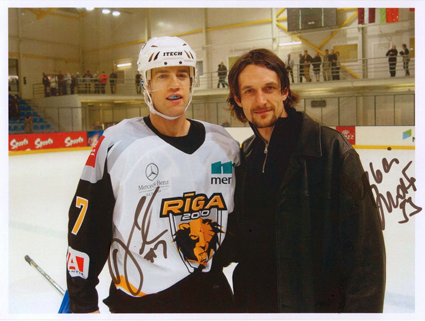 Hendrickson joined Zholtok in Riga during the 2004 lockout
Hendrickson joined Zholtok in Riga during the 2004 lockout
Zholtok would compete in just six games for HK Riga 2000.
What followed was hinted at in January of 2003, when Zholtok was forced to leave a game due to an occurrence of dizziness and fatigue and was taken to the hospital. Two nights later he skated in the pre-game warmups, but did not feel well enough to play.
The problems returned early in the 2003-04 season when he suffered a fainting spell during the second period of a game. He spent the night in the hospital and was diagnosed with hyperventilation. Additional testing ten days later at the Mayo Clinic revealed an irregular heartbeat. He missed seven games before being cleared by his cardiologist to resume play - exactly one year to the day prior to what happened next.
On the night of November 3rd, 2004, Riga 2000 travelled to Belarus for their game against Dynamo Minsk that night. Zholtok told Hendrickson before the game. "You better have the energy on our line tonight because I don't have it." Late in the game, Zholtok left the bench area to return to the locker room and collapsed. Hendrickson, still in his hockey gear ran to the team bus to retrieve his cell phone and called Minnesota Wild team medical director Sheldon Burns, telling him that Zholtok was having the "same episode as last year." For 20 agonizing minutes Burns communicated instructions through Hendrickson to the paramedics, one of whom spoke English and Russian. At one point Zholtok told Hendrickson "Don't leave." according to Hendrickson's agent Neil Sheehy. They attempted to shock his heart but all their attempts to save him failed and Zholtok died in Hendrickson's arms.
Renowned for being a dedicated family man, Zholtok left behind his wife Anna and his sons Edgar, 14 at the time, and Nikita, then just 4 years old.
Tributes to Zholtok came from all corners of the hockey world and mourners held a candlelight vigil outside the Latvian Ice Hockey Federation in Riga. There is now an annual Sergei Zholtok Memorial U20 tournament held in Riga every year and a permanent display honoring Zholtok at the Minnesota WIld's Xcel Energy Center.
Zholtok, along with fellow Latvian NHLer Irbe, was a board member of the Kids First Fund for abused and abandoned children in Latvia and Moldova. After reading the linked article, if you would like to donate to this cause that Zholtok so strongly believed in, you can do so by clicking here.
On a personal note, while Zholtok was with the Minnesota Wild, we had the opportunity to meet him in person several times, at both Wild practices and various personal appearances. One of our favorite memories is wearing our Dynamo Riga jersey to practice one day, his first professional club. Shocked to see a jersey from home, 4500 miles away, he excitedly grabbed a teammate and pulled him over to the glass exclaiming "That's from my home town!"
We would make a point of attending his personal appearances of the "question and answer" format, often asking him questions about playing for his country, which he would always answer thoughtfully and with pride. Those were one of the few questions that he did not answer with "spending time with my family" or "going fishing".
Our other favorite shared moment with Zholtok was during the time of the 2002 Olympic Games in Salt Lake City. The lower ranked nations of Slovakia, Austria, Latvia and Germany were placed in one group, while France, Switzerland, Ukraine and Belarus were placed in another group called the Preliminary Round. Only the two group winners would advance to the main competition, which began with the Qualifying Round, against the likes of Canada, Russia and the United States, etc.
Unfortunately for the lower ranked nations, the NHL did not stop their season for the Preliminary Round, forcing countries like Latvia and Slovakia to compete minus their best players, who were still obligated to their NHL clubs at the time. On February 10, 2002, Latvia faced a crucial game versus Slovakia, needing a win to keep pace with Germany for the group lead. We attended the Wild game that evening, wearing our Latvia National Team jersey in support of Zholtok, knowing that he would have his national team on his mind that evening. Standing behind the goal during warmups, Zholtok spotted us as he skated toward the goal, nodded to us and tapped his heart with his fist twice in acknowledgment of our show of understanding and support.
Without Zholtok, Sandis Ozolinsh and Irbe, who asked to be released by the Carolina Hurricanes for the Latvians crucial final game against Germany and was turned down even though Tom Barrasso was their number one goaltender at the time, Latvia had to stage a comeback to salvage a tie against Slovakia 6-6, leaving them a point behind first place and forcing a must win game against Germany, which Latvia lost 4-1 to end their Olympic participation even before their NHL reinforcements could arrive, the same fate that befell the shorthanded Slovaks, who were without such players a Ziggy Palffy, Miroslav Satan, Pavol Demitra, Marian Hossa and Peter Bondra. The Olympic hockey tournament format was amended in time for the 2006 Winter Olympics to prevent such circumstances from happening again.
********
Internationally, Zholtok would compete at both the 1990 European Junior Championships and 1991 World Juniors for the Soviet Union and the 1992 World Juniors memorably as both the Soviet Union and then the CIS. With Latvia now free to conduct their own national team program, Zholtok skated for Latvia at the 1994 World Championships in the B Pool and in 1997, 1999, 2001, 2002 and 2004 in the Top Division of the World Championships, scoring 21 goals and 32 points in 34 games at the senior level for Latvia as his NHL commitments would allow.
Zholtok skating for Latvia at the 2005 World Championships
Todays jersey is a 2002 Latvia National Team Sergei Zholtok jersey. After initially competing in blue jerseys with red trim in 1993 after regaining their independence from the Soviet Union, Latvia changed to their now customary maroon and white jerseys in 1996, an obvious choice with those being the colors of the Latvian flag.
Their jerseys would only undergo minor detail changes while remaining in use through 2004, such as collar style and sleeve number placement, and see Latvia through some of their finest moments, such as their emotionally charged 3-2 defeat of Russia at the 2000 World Championships in Russia, and defeating the Russians again 2-1 in 2003.
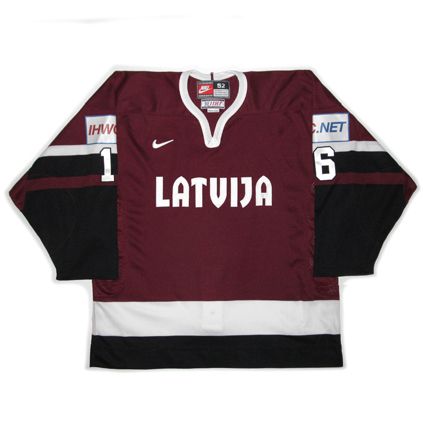
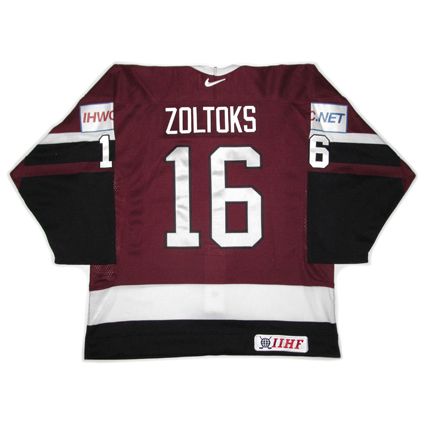
Bonus jersey: Today's bonus jersey is a 2002-03 Minnesota Wild Sergei Zholtok jersey. This jersey has the captain's "C", proudly worn by Zholtok in January of 2003. It also features one of our custom made Hockey Fights Cancer patches, worn by each team's captain for one game only, in this case Minnesota's game on January 10th vs. the Phoenix Coyotes, and then auctioned off for charity during the subsequent NHL All-Star Game weekend later that season.
Today's first video was produced by the Minnesota Wild and is from Sergei Zholtok Night at the Xcel Energy Center.
This next video features more highlights from his games with the Latvian National Team.
Here is Zholtok scoring his three goals in the 2004 World Championships against Germany, Kazakhstan and finally Austria, his final World Championships of the six he would compete in for Latvia.
Next is an extensive biography of Zholtok done by the LNT, Latvian Independant Television. It's in Latvian, but still well worth watching.
Finally, the final interview he conducted upon his return to Latvia in late 2004. Again, it's in Latvian, but it has a lot of game footage in all four parts that make it worth watching to see Zholtok in action.
To donate to the Kids First Fund, please click on the image below.
